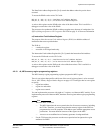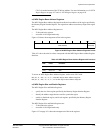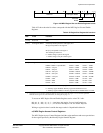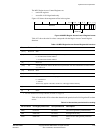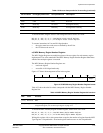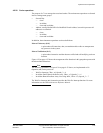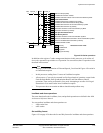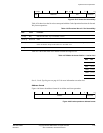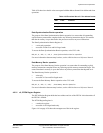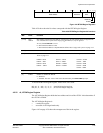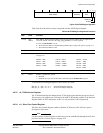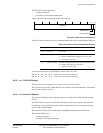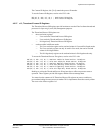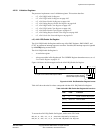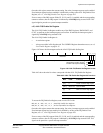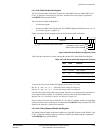
System Control Coprocessor
ARM DDI 0363E Copyright © 2009 ARM Limited. All rights reserved. 4-57
ID013010 Non-Confidential, Unrestricted Access
Table 4-38 shows how the bit values correspond with the address format for invalidate and clean
operations.
Data Synchronization Barrier operation
The purpose of the Data Synchronization Barrier operation is to ensure that all outstanding
explicit memory transactions complete before any following instructions begin. This ensures
that data in memory is up to date before the processor executes any more instructions.
The Data Synchronization Barrier Register is:
• a write-only operation
• accessible in both User and Privileged mode.
To access the Data Synchronization Barrier operation, write CP15 with:
MCR p15, 0, <Rd>, c7, c10, 4 ; Data Synchronization Barrier operation
For more information about memory barriers, see the ARM Architecture Reference Manual.
Data Memory Barrier operation
The purpose of the Data Memory Barrier operation is to ensure that all outstanding explicit
memory transactions complete before any following explicit memory transactions begin. This
ensures that data in memory is up to date before any memory transaction that depends on it.
The Data Memory Barrier operation is:
• write-only
• accessible in User and Privileged mode.
To access the Data Memory Barrier operation write CP15 with:
MCR p15, 0, <Rd>, c7, c10,5 ; Data Memory Barrier Operation.
For more information about memory barriers, see the ARM Architecture Reference Manual.
4.2.21 c9, BTCM Region Register
The BTCM Region Register holds the base address and size of the BTCM. It also determines if
the BTCM is enabled.
The BTCM Region Register is:
• a read/write register
• accessible in Privileged mode only.
Figure 4-41 on page 4-58 shows the arrangement of bits in the register.
Table 4-38 Functional bits of c7 for address format
Bits Field Function
[31:5] Address Specifies the address to invalidate or clean
[4:0] Reserved SBZ



